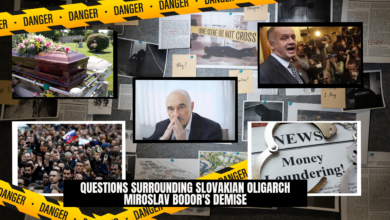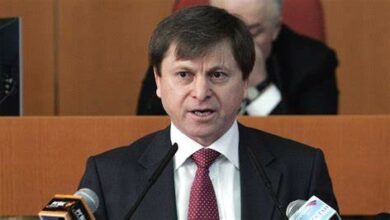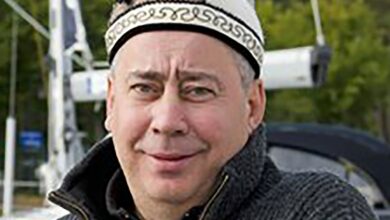Ex-KGB spy and oil magnate Viatcheslav Rovneiko dies mysteriously in latest high-profile Russian death
Ex-KGB spy and oil magnate Viatcheslav Rovneiko, aged 59, was discovered in an unresponsive state during the late hours of last night within the confines of his heavily secured residential compound. Notably, there were no indications of any violent circumstances leading to his condition, as no visible signs of physical harm or foul play were detected on his person.
A Russian death tycoon who had significant ties to Vladimir Putin’s chief of foreign intelligence has been discovered deceased within the confines of his secure residential compound, as indicated by initial reports. Ex-KGB spy and oil magnate Viatcheslav Rovneiko, aged 59, was discovered in an unconscious state late last night, and despite the diligent efforts of
they were unable to resuscitate him. Consequently, authorities have initiated an inquiry into the circumstances surrounding his reported demise.
About Ex-KGB spy and oil magnate Viatcheslav Rovneiko
Rovneiko is thought to have operated as a spy for the KGB during the Cold War era, and he was stationed in Belgium alongside Sergei Naryshkin, who presently serves as the head of Russia’s foreign intelligence agency, the SVR. Additionally, there are reports suggesting that he had a close association with Gennady Timchenko, a billionaire widely regarded as one of President Putin’s most steadfast allies.
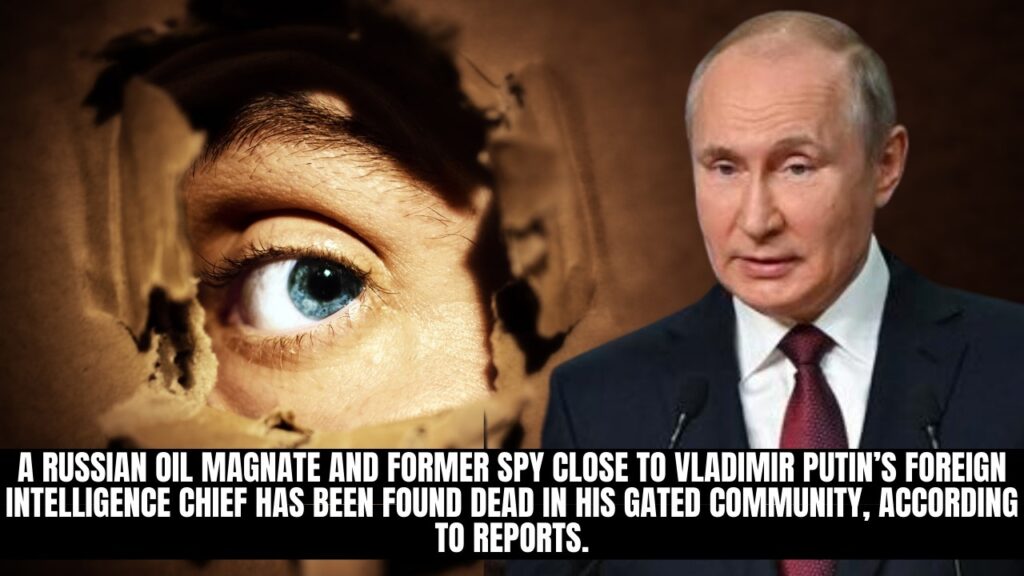
Rovneiko’s former business partner was Leonid Dyachenko, whose wife, Tatiana Dyachenko, held significant influence as the daughter of Boris Yeltsin, Russia’s inaugural president. Together, Rovneiko and Dyachenko established Urals Energy, a notable player in the oil industry, among several others in which he was involved. Urals Energy became a publicly traded company in London in 2005.
Reports indicate that Rovneiko had business interests extending to various countries, including the United Kingdom, Belgium, Luxembourg, and Cyprus. In fact, he was reported to have held a Belgian passport in 2006.
Rovneiko’s educational background included graduation from the prestigious Institute of International Relations in Moscow, commonly known as MGIMO, which has a reputation for training individuals for careers in intelligence and diplomacy.
Personal Life
The Russian death business databases revealed intriguing details about the former spy, portraying him as an enigmatic figure shrouded in secrecy, almost as if he had no discernible identity. Within these records, he was linked to a woman named Irina, who was his spouse and a fellow student at MGIMO. Irina, now 63 years old, and the ex-spy had a son named Nikolay, who is currently 40 years old and pursuing a career as an investment banker in London while also pursuing studies at Kingston University.
In a recent and unsettling development, the discovery of Marina Yankina, aged 58, near a house entrance in St. Petersburg sent shockwaves through the region. She is believed to have tragically fallen from a height of 160 feet, resulting in her untimely demise. Yankina held a prominent position, overseeing a department within the Kremlin that was dedicated to fundraising efforts for the Ministry of Defence, particularly in the context of the ongoing conflict in Ukraine.
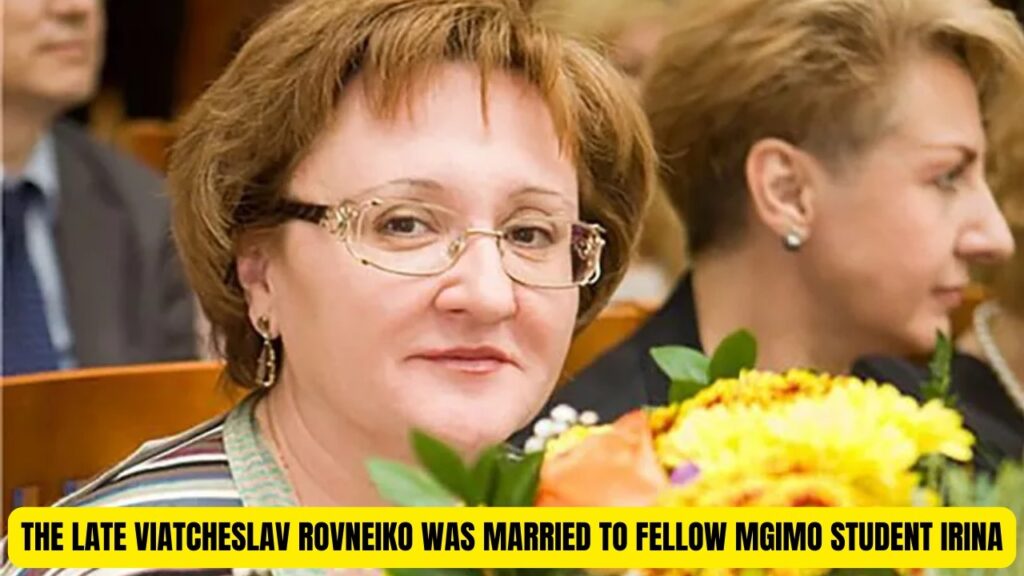
This unsettling incident is just one in a series of suspicious deaths that have plagued Russia in recent years. Startlingly, between 2014 and 2017, the Atlantic magazine reported a total of 38 cases involving Russian businessmen and oligarchs with close ties to the Kremlin who died under mysterious or dubious circumstances. These occurrences have added a layer of intrigue and suspicion to the backdrop of Russia’s political and business landscape.
The Story Behind His Death
Ex-KGB spy and oil magnate Viatcheslav Rovneiko, a well-connected individual aged 59, was discovered in an unconscious state during the late hours of the night at his residence within an exclusive gated community. According to local sources, despite the best efforts of medical professionals, he was not able to survive. The details surrounding the cause of his demise remain shrouded in uncertainty, prompting an ongoing investigation into the matter. It is worth noting that no apparent indications of a violent end were evident upon examination of his body.
Mysterious Deaths Among Russian Elites Amid Ukraine Conflict
Wagner Group Leader Yevgeny Prigozhin’s Recent Death Sparks Concern
Yevgeny Prigozhin’s Tragic Plane Crash:
Yevgeny Prigozhin, the leader of the Wagner Group, met a tragic end in a plane crash while traveling between Moscow and Saint Petersburg. His death came shortly after a mutiny by his mercenaries in June, which strained his relationship with President Putin.
Speculation Surrounding Prigozhin’s Death:
Many speculate that Prigozhin’s death might be a political assassination, signaling a warning to Russia’s elites ahead of the 2024 elections. Ukrainian presidential aide Mykhailo Podolyak shares this sentiment.
Putin’s Response:
President Putin offered condolences and acknowledged Prigozhin’s contribution to fighting in Ukraine. He described Prigozhin as a complex figure with both achievements and mistakes. Several Russian elites have died under mysterious circumstances in the past year, raising concerns and conspiracy theories.
Deaths in Early 2022:
The string of unusual deaths began in early 2022, just before Putin’s invasion of Ukraine. Notable figures like Leonid Shulman, Alexander Tyulakov, Igor Nosov, and Mikhail Watford were among those who passed away.
Bizarre Deaths:
Some deaths took on bizarre and perplexing forms, such as Vasily Melnikov’s family stabbing and Vladislav Avayev’s murder-suicide. Alexander Subbotin’s death, involving a shaman and Jamaican voodoo rituals, stood out as particularly unusual.
Continued Deaths:
The pattern of elite deaths persisted into late 2022, with Pavel Antonov’s fatal fall from a hotel window in India. Several of these individuals had voiced criticism of Putin’s actions in Ukraine.
Despite these puzzling incidents, there is no clear and definitive explanation for these deaths. Many have noted the connection between the outspokenness of these elites and their unfortunate fates.
The death of Yevgeny Prigozhin, along with the string of mysterious deaths among Russian elites, remains a topic of intrigue and speculation, leaving many questions unanswered about the circumstances surrounding these individuals’ demises.
Other mysterious Russian deaths or attacks surrounding Putin
Boris Nemtsov
In 2015, Boris Nemtsov, a prominent Russian opposition figure known for his strong criticism of the Putin administration, was fatally shot in an assault that took place on a bridge within sight of the Kremlin.
- He met his demise just a few days prior to his scheduled leadership of an uncommon public demonstration against Russia’s takeover of Ukraine’s Crimean area and its backing of separatist activities in eastern Ukraine’s Donbas region.
- The Kremlin disavowed any participation, while in 2017, a Russian court found five individuals guilty of Nemtsov’s murder in a trial that his family labeled as an attempt to conceal the truth.
- In the years that followed, it came to light that a government agent working with a group that carried out assassinations had been closely watching him in the months before his death.
Alexei Navalny
The leader of the opposition, Navalny, who is currently incarcerated for approximately three decades, was poisoned in August 2020 using a potent nerve agent known as Novichok, a product of Soviet Union’s research and development.
- The Kremlin claimed no responsibility, but later inquiries conducted by Bellingcat revealed that the individuals behind the assault were affiliated with Russia’s Federal Security Service (FSB) and that the decision to poison him had come from the highest levels of the Kremlin.
Alexander Litvinenko:
In 2006, Litvinenko, a former KGB agent turned whistleblower, passed away in the United Kingdom as a result of poisoning with a scarce and extremely radioactive substance known as polonium-210.
- Once more, Russia has refused any participation, yet both the United Kingdom and the European Court of Human Rights have reached the determination that Russia likely played a role. The UK investigation even went as far as suggesting that Putin “likely sanctioned” the assassination of Litvinenko.
- One of the indications suggesting the Kremlin’s participation is the observation that nearly all the global supply of polonium-210 originates from state-managed nuclear facilities in Russia, where nuclear authorities have emphasized strict oversight over access to this element.
Sergei Skripal:
In 2018, Skripal, a former Russian intelligence operative residing in the United Kingdom, along with his daughter, fell victim to an assault in Salisbury. They were targeted with a nerve agent that bore a resemblance to the substance employed in the attack against Navalny.
- Skripal and his daughter managed to survive, but a British citizen lost their life, and several others were harmed when they encountered a perfume container suspected to be linked to the incident.
- The United States, the United Kingdom, and several other countries have jointly determined that individuals affiliated with the Russian military intelligence agency were responsible for the poisonings. Furthermore, the United Kingdom has formally accused three members of this agency in connection with the incidents.
Yuri Shchekochikhin:
In July 2003, Russian investigative journalist and liberal lawmaker Shchekochikhin experienced a sudden illness and passed away. Doctors at a hospital associated with the Kremlin stated at the time that his cause of death was attributed to a severe allergic reaction.
- His family members have reported that Shchekochikhin endured a harrowing 12-day period characterized by excruciating pain, during which his skin progressively peeled off, his hair fell out, and his organs suffered successive failures.
- When they requested access to Shchekochikhin’s medical records, medical professionals informed his family that these documents were being held by prosecutors, citing them as a “medical secret.” This was in relation to an investigation that would not be initiated until several years later.
- In the years leading up to his demise, Shchekochikhin had published investigative reports exposing a smuggling operation, money laundering activities, and a corruption scandal involving high-ranking FSB (Federal Security Service) agents.
- Additionally, he had been delving into the potential involvement of the FSB in the 1999 Moscow apartment bombings, an event that played a part in triggering the Second Chechen War.
Anna Politkovskaya
In October 2006, Anna Politkovskaya, a Russian journalist and advocate for human rights, was fatally shot in her residence located in Moscow.
- She had documented human rights abuses during the Second Chechen War and authored a book in 2004, asserting that Putin, via the FSB, was suppressing civil liberties to steer the nation toward a Soviet-style dictatorship before she passed away.
- In 2014, a Moscow court convicted five men for her murder, but the identity of the individual who ordered her assassination was never determined.
Multiple Russian oligarchs and executives also died :
According to a report from The New York Times, a number of prominent Russian oligarchs and high-ranking executives have met untimely deaths in perplexing circumstances, including suicides and accidents, since the commencement of Russia’s invasion of Ukraine.
- Ravil Maganov, who held the position of Chairman of the Board at Lukoil, a prominent Russian conglomerate, experienced a tragic and unexpected demise in September 2022. This unfortunate incident occurred when he fell from a hospital window in Moscow. The circumstances surrounding his death garnered significant attention and controversy in Russia and beyond.
- Russian media initially reported that Ravil Maganov had taken his own life, implying that it was a case of suicide. However, in response to these reports, Lukoil released an official statement following his passing. According to the company’s statement, Maganov did not succumb to suicide but rather passed away as a result of a severe illness.
The sudden and perplexing nature of Maganov’s death, along with the contrasting narratives presented by the media and Lukoil, added an extra layer of complexity to this tragic event. It raised questions and speculation within both the business community and the public, leaving many seeking further information and clarity about the circumstances surrounding the loss of a key figure in one of Russia’s largest private corporations.





